The best ad blockers in 2025
Say goodbye to intrusive online advertising with the best ad blockers

Here at Tom’s Guide our expert editors are committed to bringing you the best news, reviews and guides to help you stay informed and ahead of the curve!
You are now subscribed
Your newsletter sign-up was successful
Want to add more newsletters?

Daily (Mon-Sun)
Tom's Guide Daily
Sign up to get the latest updates on all of your favorite content! From cutting-edge tech news and the hottest streaming buzz to unbeatable deals on the best products and in-depth reviews, we’ve got you covered.

Weekly on Thursday
Tom's AI Guide
Be AI savvy with your weekly newsletter summing up all the biggest AI news you need to know. Plus, analysis from our AI editor and tips on how to use the latest AI tools!

Weekly on Friday
Tom's iGuide
Unlock the vast world of Apple news straight to your inbox. With coverage on everything from exciting product launches to essential software updates, this is your go-to source for the latest updates on all the best Apple content.

Weekly on Monday
Tom's Streaming Guide
Our weekly newsletter is expertly crafted to immerse you in the world of streaming. Stay updated on the latest releases and our top recommendations across your favorite streaming platforms.
Join the club
Get full access to premium articles, exclusive features and a growing list of member rewards.
The best ad blockers are unfortunately very necessary to survive on the modern internet. It doesn't matter which sites you browse, there's the risk of being harassed by pop-ups, tracker cookies, malvertising and countless other digital nasties hell-bent on ruining your online experience.
Thankfully there's no shortage of apps and browser extensions that can block ads and keep you safer when you're online. Combined with the best antivirus software and the best VPNs, a good ad-blocker gives you a perfect arsenal of tools to offer as much protection as possible. Even the FBI recommends using an ad-blocker for protection.
The only thing you need to figure out is which ad-blocker is right for what you need. There are so many to choose from, so we've got a thorough list of the best ad blockers and privacy tools — with options for different browsers and platforms.
Reader Offer: Save up to 52%
Get all-in-one security with Aura's Ad Blocker, Password Manager, VPN, and ID Theft Protection. Compatible with all major browsers.. Save 52% when you sign up today.
Preferred partner (What does this mean?)
The best ad blockers you can get today
1. uBlock Origin (Firefox, Edge)
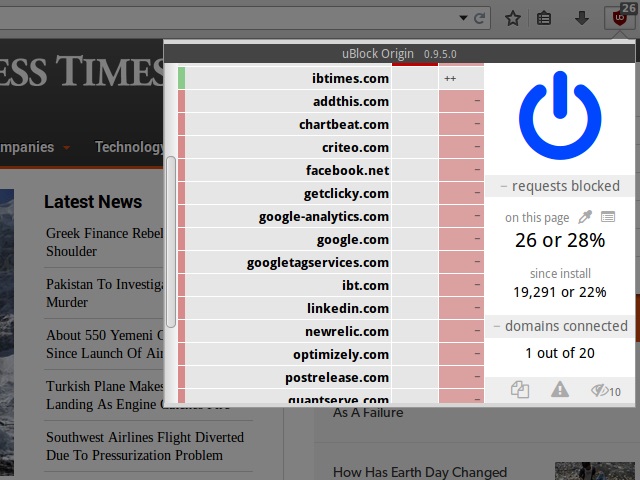
uBlock Origin is a browser-based ad blocker that focuses on simple, efficient blocking with a low resource overhead. The extension comes loaded with a number of filter lists for known advertising and malware sources, with extra filter lists available and the option to read and create your own custom filters from hosts files.
The best part about uBlock Origin is that it's been designed to be easy on your computer's CPU and memory. Meaning it shouldn't cause a drain on your system like other ad-blockers might be prone to doing. It's also open-source, with the goal of preserving user privacy, and trends to stay up to date to get around some of the more irritating anti-ad-block techniques employed around the web.
Unfortunately Google has removed uBlock Origin from the Chrome store because "it doesn't follow best practices for Chrome extensions.". The extension still works for those that already had it, but new users are out of luck. Thankfully the developers have filled the gap with UBlock Origin Lite. They claim it's not as capable as the original, but the differences aren't that noticeable to the user.
Download uBlock Origin: Firefox, Edge, Opera
Download uBlock Origin Lite: Chrome
Get instant access to breaking news, the hottest reviews, great deals and helpful tips.
2. AdBlock Plus (Chrome, Edge, Firefox, Opera, Safari, Android, iOS)
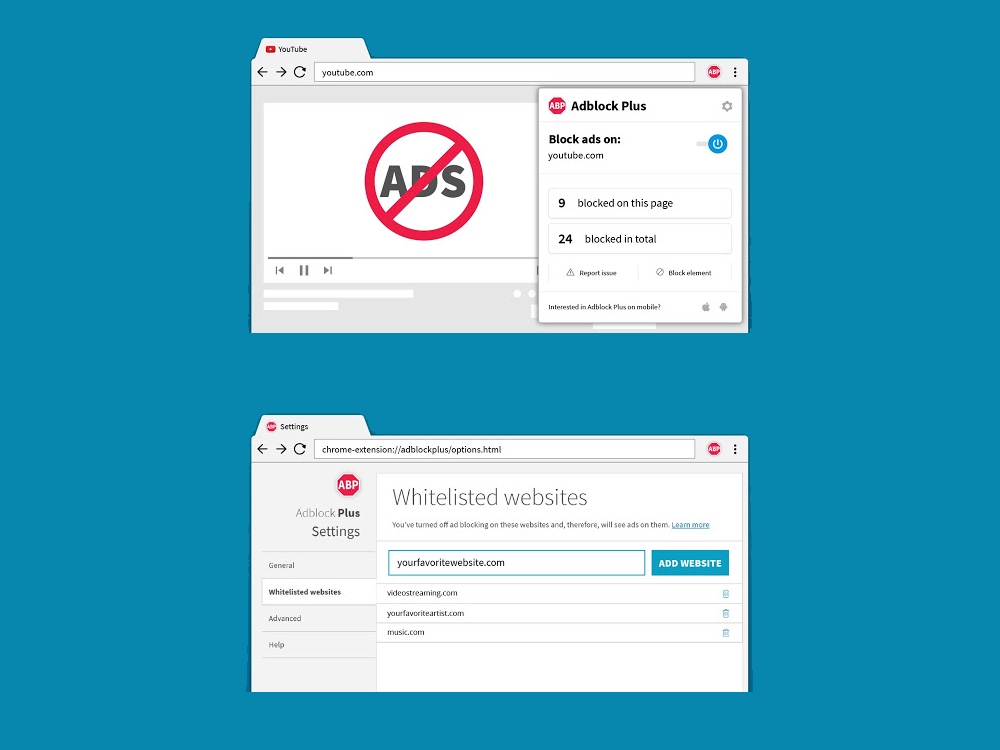

AdBlock Plus (ABP) is among the most popular ad blockers, with extensions available for Firefox, Chrome, Safari, Edge and Opera. ABP features a quick setup, loading preset filter lists that allow users to quickly block most ads, as well as the option to filter malware and social media buttons.
Savvy users can chose additional block lists as well as set custom filters or whitelist their favorite sites to keep their ad revenue in the black. AdBlock Plus allows what it calls "non-intrusive advertising" through filters; that may irk some users, though this feature can be disabled in settings.
On Android, the AdBlock Browser provides a Firefox-based browser that blocks incoming advertising, while on iOS, the AdBlock Plus app integrates with the content blocker system to seamlessly block advertising on Safari with minimal setup.
Download AdBlock Plus: Firefox, Chrome, Safari, Opera, Edge
3. AdBlock (Chrome, Firefox, Safari, Edge)
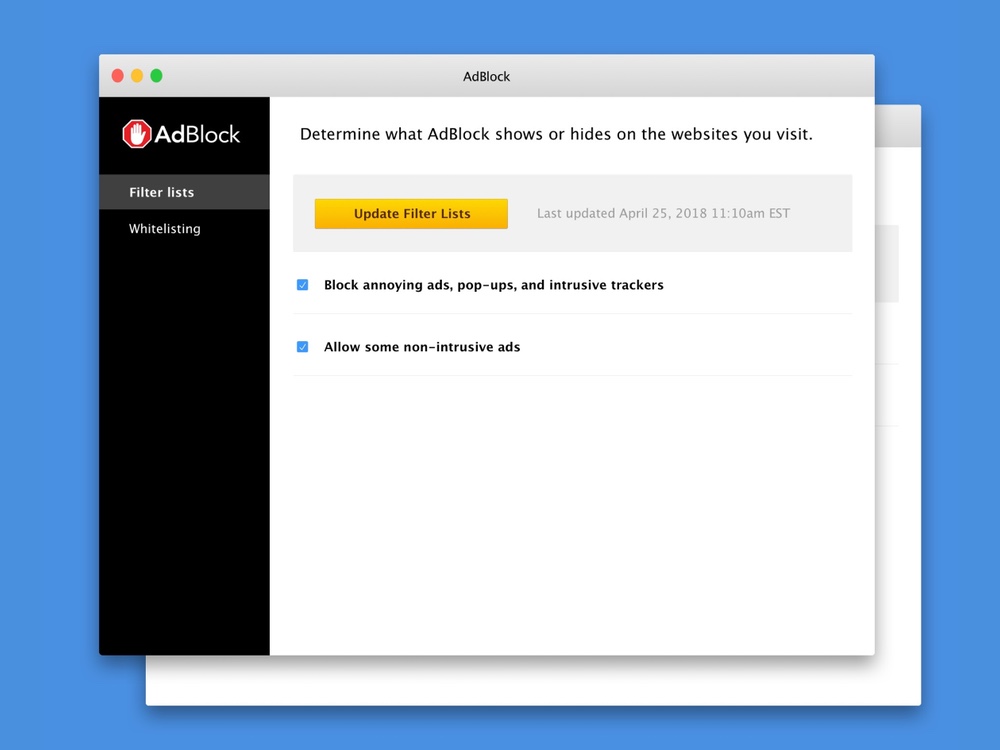
AdBlock (no relation to AdBlock Plus) is the other great ad-blocking browser extension of note, available for users of Chrome, Firefox, Edge and Safari. AdBlock uses a series of filter lists to automatically block ad content coming from known ad servers and providers. Users can stick with the default block lists, subscribe to additional ones, or even create their own, as well as whitelist their favorite websites.
As one of the most downloaded Chrome and Safari extensions, AdBlock has the trust of many users worldwide.
Download AdBlock: Chrome, Firefox, Safari, Edge
4. Poper Blocker (Chrome)
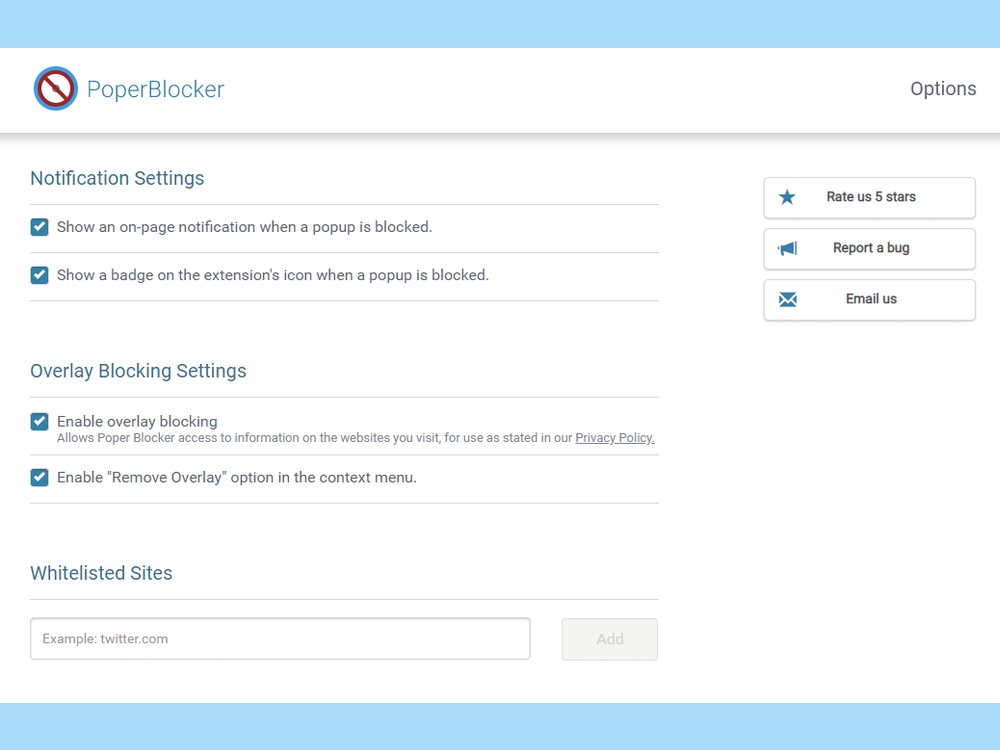
Rather than be an all-in one blocking solution, Poper Blocker (aka Pop Up Blocker For Chrome), is designed to complement other adblockers.
In this case, Poper Blocker focuses on blocking pop-ups, pop-unders, overlays, timed and scroll pop-ups, and other varieties that might slip past other ad-blocking extensions. Small notifications tell you when pop-ups are blocked. You also can view your blocking stats, but otherwise, you can generally just keep Poper Blocker running in the background with minimal impact alongside other adblocker extensions.
Download Poper Blocker: Chrome
5. Stands Free Adblocker (Chrome, Firefox, Edge)
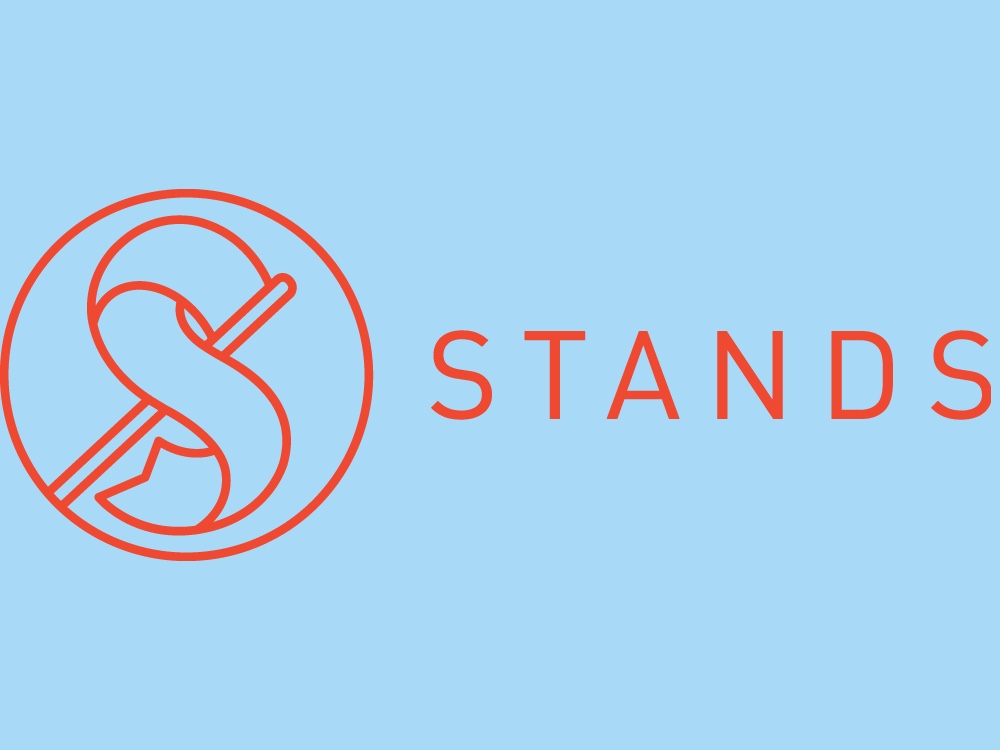
For a fast and light ad-blocking plugin, Chrome users can turn to Stands Free AdBlocker. The extension does precisely what it promises, blocking ads and pop-ups from cluttering up your browser view while also preventing any tracking from going on.
Stand's Free AdBlocker gives you control over the type of ads you can block, specifying everything from autoplay video ads, YouTube ads, expanding ads and more. It can even block Facebook ads if you want.
Stands also gives you the ability to allow certain types of ads or even whitelist ad-supported websites you don't want to shortchange when it comes to badly needed revenue. This is one ad blocker that doesn't take a scorched earth approach to its stated purpose.
Download Stands Free AdBlocker: Chrome, Firefox, Edge
6. Ghostery (Chrome, Firefox, Opera, Safari, Edge)
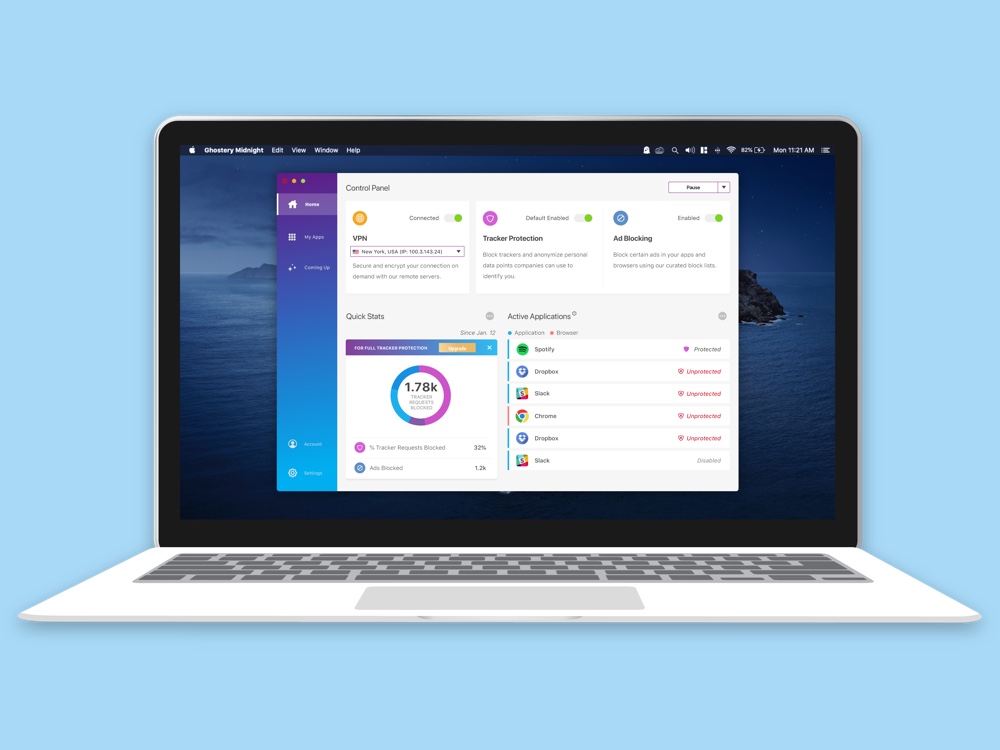
Like the other extensions on our list of the best ad blockers, Ghostery can remove ads from webpages, so you can focus on content and browse more efficiently. But the real value in Ghostery lies in its privacy protection features.
You can use Ghostery to view trackers, which lets you see who's trying to collect data on you. With Ghostery, you can also stop that tracking from taking place. If you really want to safeguard your privacy, you can turn to Ghostery's Enhanced Anti Tracking to anonymize your data.
Ghostery's a free download that offers basic web protection. More advanced protection starts at $4.99 a month and the $11.99 monthly tier comes with a built-in VPN. There are also versions of Ghostery that work with Android and iOS devices.
Download Ghostery: Chrome, Firefox, Opera, Safari, Edge
7. Adblocker for YouTube (Chrome, Firefox)
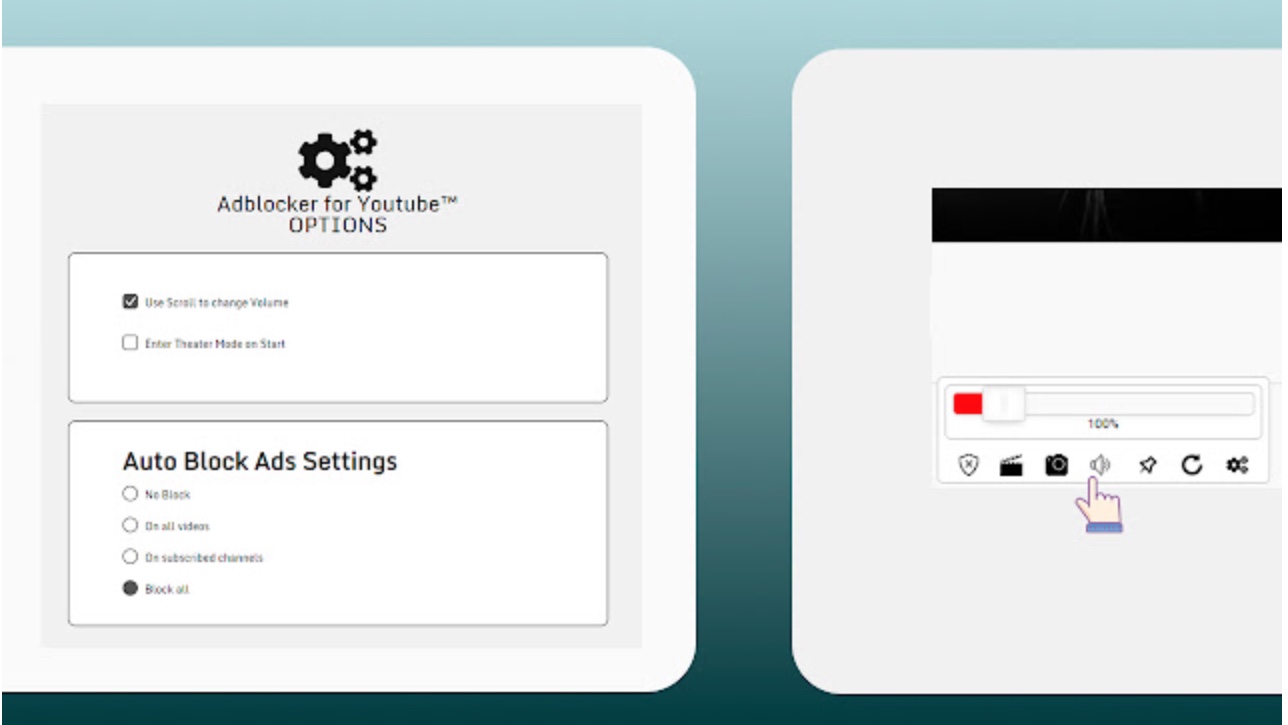
YouTube has gotten more aggressive with ads, so the makers of ad-blocking extensions have followed suit. Adblocker for YouTube is a Chrome extension that promises to automatically block YouTube ads, whether we're talking about the pre-roll ad appearing before your video or any text and banner ads that appear on the video itself.
If you prefer Firefox to Chrome, there's also an AdBlocker for YouTube extension that works on that browser. Same name, different developer apparently, but the functionality of stripping out video and display ads remains. This version works on Android devices too.
Download Adblocker for YouTube: Chrome, Firefox
7. AdGuard (Windows, Mac, Android, iOS)
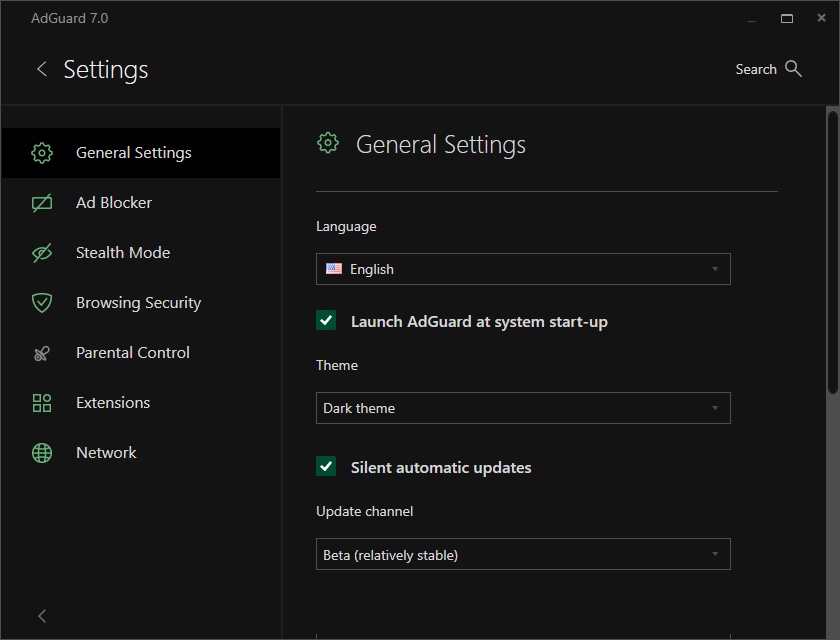
Uses looking for a more robust experience can try out the subscription-based AdGuard, which provides desktop and mobile options to reduce the ads you see when surfing online.
AdGuard on Windows and Mac covers popular browsers, with highly configurable options for ads, content, and tracker blocking, as well as a parental controls module for restricting adult content. AdGuard for Android is a no-root ad-blocker that blocks advertising on apps and games, though you’ll have to install it from AdGuard’s site instead of through Google Play. AdGuard for iOS works with Safari to effectively filter ads on the default browser.
Download AdGuard: Windows, Mac, Android, iOS
8. AdLock (Windows, Mac, Android, iOS; $3.50 a month)

AdLock avoids the browser-based route, instead opting to run as a separate program to be able to block not only browser-based ads, but also advertising in other programs like Skype or games. Pricing plans start at $3.50 per month.
The app runs in the background, using filters to block ads, popups, and autoplaying videos, speeding up loading times and applying Safe Browsing features to automatically block sites that are known to be unsafe.
For obvious reasons, the mobile version is unavailable on the Google Play Store, so you'll need to sideload the app if you want to get AdLock into your Android device. iOS users can download AdLock directly from Apple's App Store.
Download AdLock: Windows, Chrome, Android, Mac, iOS
9. Wipr (macOS, iOS; $1.99)
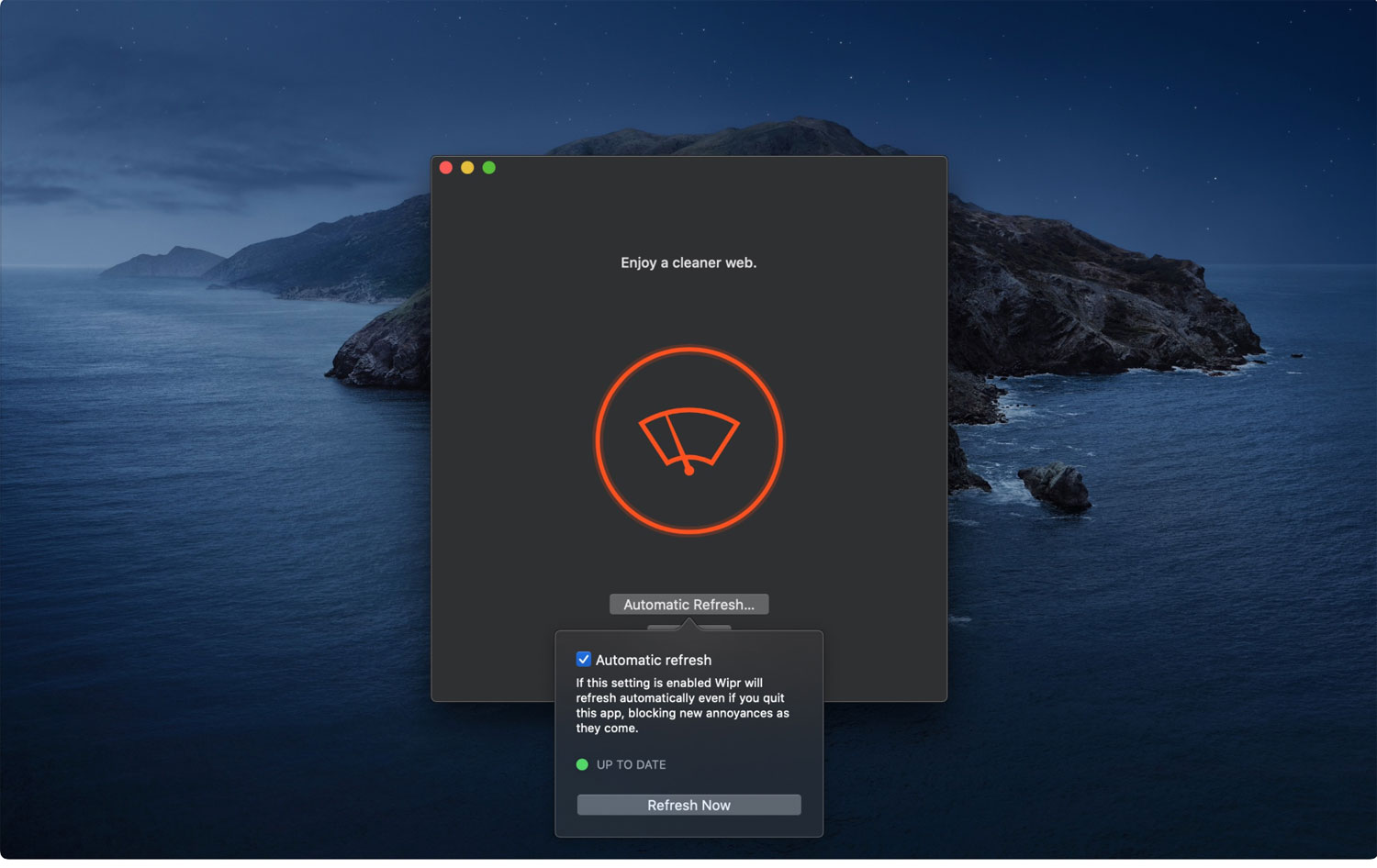
If you’re a Safari fan, Wipr may be the best ad blocker for both your Mac and iPhone. The app is available for both iOS and macOS — costing $1.99 from either Apple App Store — and it promises to work with Safari as well as apps that use Safari for displaying web pages.
You’ll find a full array of features with Wipr, which not only blocks apps and trackers, but cryptocurrency miners, EU cookie and GDPR notices and anything else that gets in your way of surfing the web. Its blocklist gets updated twice a week, and there’s little configuration; the idea is that you load Wipr and forget that it’s there while it does its job in the background.
With Wipr, pages should load faster in Safari, which will be particularly welcome if you’re surfing from an iPhone, where ads and trackers can bog down your browser’s speed.
FAQs: How to choose the best ad blocker
What the benefit of using an ad blocker?
You'll struggle to go anywhere online without seeing some kind of advertising. Whether it's a YouTube video for making soup, or an article schooling you on how to clean your earbuds. Advertising brings money in for sites and videos hosting them, so they're a pretty common sight.
An ad blocker, as the name suggests will block those ads from loading, letting you go about your online business uninterrupted. While some ad blockers do give you the option to allow non-intrusive ads, this typically means you'll be free of static ad blocks, banner ads, and commercials interrupting whatever video you're trying to enjoy.
Why are ads so prevalent?
Online advertising is not something any of us like, but it also plays an important role in keeping the internet going. The fact that you're able to access sites like Tom's Guide, or watch content from your favorite creators, is because advertising is there to keep the lights on. Without it, huge sections of the internet would be stuck behind paywalls — assuming they existed at all.
What's the difference between an ad blocker and tracker blocker?
An ad blocker is designed to stop you stop you from seeing ads online. Tracker blockers on the other hand are more privacy focussed, and are built to stop you being tracked by cookies across the internet.
Because ads and trackers often come together, a tracker blocker will also stop you seeing a lot of advertising by default. Likewise an ad blocker won't stop companies and websites tracking you. Some software can do both, but that's not guaranteed. So bear that in mind when choosing an ad blocker.
Should we not use ad blockers?
Yes and no. For all the good advertising revenue can offer, there is a dark side to advertising as well. At the low end of that spectrum are the intrusive ads, the pop-ups and the takeovers that are difficult to get rid of. But the other end is a lot more sinister.
Ads designed to infect your machine with malware, or direct you to phishing scams, and all kinds of other ways to trick you or steal your information. It's for this very reason that the FBI has recommended people do use an ad blocker to better protect themselves and their machines.
So what should we do?
Our advice is to always use an ad blockers on sites you're unfamiliar with or don't trust. But consider whitelisting trustworthy sites and creators you like, so they can bring in whatever advertising money they can, and you can keep enjoying their work long into the future.
Should I get a desktop app or browser extension?
The majority of the best ad-blockers are browser extensions, blocking ads from showing up in your browser — without touching the rest of your machine. Meanwhile ad blocking apps can block apps across your entire device, including general browsing and other apps. But which is right for you?
Browser extensions are limited, but are also simple and very good at what they do. Ad blocking apps offer more, with some offering better security without the limitations browsers can impose. But they typically need a lot more power and resources to make it happen — which could slow down your machine or drain your battery faster.
There's no wrong answer here, and both options are good ones. It just depends on what your needs are, and whether you only care about seeing ads online or not.
Are ad blockers available on mobile?
Yes, there are plenty of ad blocking apps and extensions available on mobile. However, since Google isn't a fan of ad blockers, it's much harder for Android users to get them from official channels like Google Play. However Apple and the App Store don't have nearly as many qualms.
Some of our favorite options include 1Blocker (iOS), Firefox Focus (Android, iOS) and AdClear (Android, iOS)
How we test the best ad blockers
Our ad blocker testing process involves downloading and installing a number of ad blocking browser extensions and apps. Once installed we go through the setup process to see how easy they are to get going, followed by a trip into the settings menu to see how easy they are to customize.
From there we took ourselves to the internet, checking though various different major website that are often loaded with ads. We specifically looked for how well ads are blocked, and how they impacted the browser experience.
We also took into consideration 4 different criteria to make our decision. These include:
Cost: Figuring out how much value these ad blockers have, in the event that they're not free to use. On top of that, figuring out whether the free options are the best ones, and whether paying a bit of money would offer a noticeably better features and experiences.
Performance: Did the ad blockers actually block all the ads on page? Was there a noticeably slower loading time? All of these things matter when comparing different ad blockers.
Use: No good ad blocker gatekeeps its abilities, and the best options should be working seamlessly in the background with minimal setup required. However we also need to take into consideration customization options in the settings, and how much you can tweak things to personalize your ad blocking experience.
Availability: Pretty simple, some ad blockers are available just about everywhere. Others are limited to a handful of platforms or browsers. Obviously the more widespread an ad blocker is, the better.
You must confirm your public display name before commenting
Please logout and then login again, you will then be prompted to enter your display name.
 Club Benefits
Club Benefits







